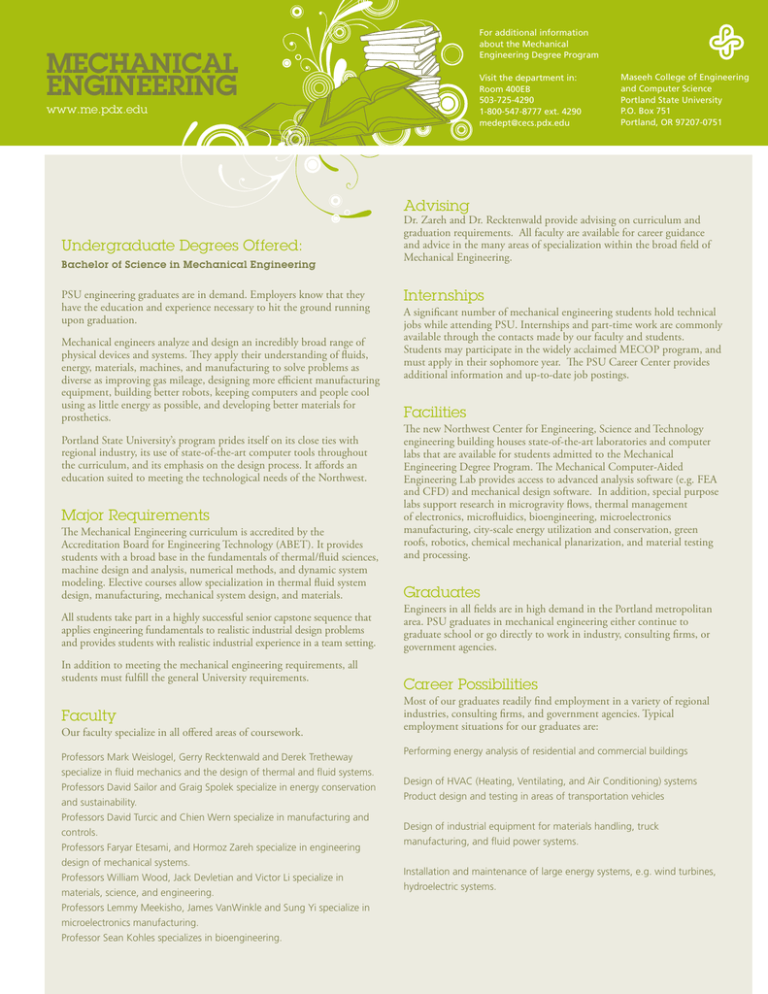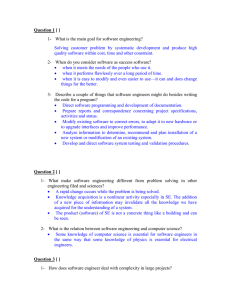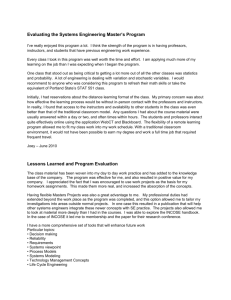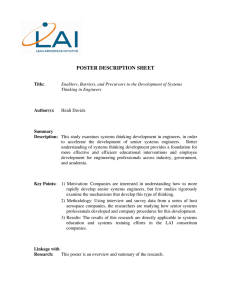mechanical engineering
advertisement

For additional information about the Mechanical Engineering Degree Program MECHANICAL ENGINEERING Visit the department in: Room 400EB 503-725-4290 1-800-547-8777 ext. 4290 medept@cecs.pdx.edu www.me.pdx.edu Maseeh College of Engineering and Computer Science Portland State University P.O. Box 751 Portland, OR 97207-0751 Advising Undergraduate Degrees Offered: Bachelor of Science in Mechanical Engineering PSU engineering graduates are in demand. Employers know that they have the education and experience necessary to hit the ground running upon graduation. Mechanical engineers analyze and design an incredibly broad range of physical devices and systems. They apply their understanding of fluids, energy, materials, machines, and manufacturing to solve problems as diverse as improving gas mileage, designing more efficient manufacturing equipment, building better robots, keeping computers and people cool using as little energy as possible, and developing better materials for prosthetics. Portland State University’s program prides itself on its close ties with regional industry, its use of state-of-the-art computer tools throughout the curriculum, and its emphasis on the design process. It affords an education suited to meeting the technological needs of the Northwest. Major Requirements The Mechanical Engineering curriculum is accredited by the Accreditation Board for Engineering Technology (ABET). It provides students with a broad base in the fundamentals of thermal/fluid sciences, machine design and analysis, numerical methods, and dynamic system modeling. Elective courses allow specialization in thermal fluid system design, manufacturing, mechanical system design, and materials. All students take part in a highly successful senior capstone sequence that applies engineering fundamentals to realistic industrial design problems and provides students with realistic industrial experience in a team setting. In addition to meeting the mechanical engineering requirements, all students must fulfill the general University requirements. Faculty Our faculty specialize in all offered areas of coursework. Professors Mark Weislogel, Gerry Recktenwald and Derek Tretheway specialize in fluid mechanics and the design of thermal and fluid systems. Professors David Sailor and Graig Spolek specialize in energy conservation and sustainability. Professors David Turcic and Chien Wern specialize in manufacturing and controls. Professors Faryar Etesami, and Hormoz Zareh specialize in engineering design of mechanical systems. Professors William Wood, Jack Devletian and Victor Li specialize in materials, science, and engineering. Professors Lemmy Meekisho, James VanWinkle and Sung Yi specialize in microelectronics manufacturing. Professor Sean Kohles specializes in bioengineering. Dr. Zareh and Dr. Recktenwald provide advising on curriculum and graduation requirements. All faculty are available for career guidance and advice in the many areas of specialization within the broad field of Mechanical Engineering. Internships A significant number of mechanical engineering students hold technical jobs while attending PSU. Internships and part-time work are commonly available through the contacts made by our faculty and students. Students may participate in the widely acclaimed MECOP program, and must apply in their sophomore year. The PSU Career Center provides additional information and up-to-date job postings. Facilities The new Northwest Center for Engineering, Science and Technology engineering building houses state-of-the-art laboratories and computer labs that are available for students admitted to the Mechanical Engineering Degree Program. The Mechanical Computer-Aided Engineering Lab provides access to advanced analysis software (e.g. FEA and CFD) and mechanical design software. In addition, special purpose labs support research in microgravity flows, thermal management of electronics, microfluidics, bioengineering, microelectronics manufacturing, city-scale energy utilization and conservation, green roofs, robotics, chemical mechanical planarization, and material testing and processing. Graduates Engineers in all fields are in high demand in the Portland metropolitan area. PSU graduates in mechanical engineering either continue to graduate school or go directly to work in industry, consulting firms, or government agencies. Career Possibilities Most of our graduates readily find employment in a variety of regional industries, consulting firms, and government agencies. Typical employment situations for our graduates are: Performing energy analysis of residential and commercial buildings Design of HVAC (Heating, Ventilating, and Air Conditioning) systems Product design and testing in areas of transportation vehicles Design of industrial equipment for materials handling, truck manufacturing, and fluid power systems. Installation and maintenance of large energy systems, e.g. wind turbines, hydroelectric systems. Scholarships There are many scholarships available to mechanical engineering students. The following is just a sample listing: Julie & Bill Reiersgaard Mechanical Engineering Scholarship offers one award to a female, upper-division major intending to remain in Oregon after graduation. Boeing Company Scholarship offers three awards to mechanical engineering students. Professional Engineers of Oregon Scholarship offers two awards to engineering majors who graduated from an Oregon high school and are currently Oregon residents. For information and an application form for engineering and computer science scholarships, call 503-725-4631 or visit www.cecs.pdx.edu. For a complete listing of Portland State’s scholarships, visit the website at www.pdx.edu/finaid/scholarships.html. You may also contact the scholarship coordinator at 503-725-5445. Clubs and Organizations To introduce mechanical engineering students to professional practice, many professional organizations have PSU chapters: American Indian Science and Engineering Society (AISES) American Society of Mechanical Engineers (ASME) Engineers Without Borders (EWB-USA) National Society of Black Engineers (NSBE) National Society of Professional Engineers (NSPE) Society of Automotive Engineers (SAE) Society of Women Engineers (SWE) Tau Beta Pi (TBP) Requirements for Major Freshman Year Credits EAS 101 Engineering Problem Solving (4) EAS 115 Engineering Graphics (3) Ch 221, 222 General Chemistry (8) Ch 227, 228 General Chemistry Laboratory (2) Mth 251, 252 Calculus I, II, (8) Mth 261 Linear Algebra (4) UNST 101 Freshman Inquiry (15) Total (44) Sophomore Year Credits EAS 211 Statics (4) EAS 212 Strength of Materials (4) EAS 213 Properties of Materials (4) EAS 215 Dynamics (4) ME 241 Manufacturing Processes (4) ECE 241 Electric Circuits (4) ECE 241L Electrical Engineering Laboratory (1) Mth 254 Calculus IV (4) Mth 256 Applied Differential Equations I (4) Ph 221, 222, 223 General Physics (with Calculus) (9) Ph 214, 215, 216 Physics Laboratory (3) UNST 299 Sophomore Inquiry (12) Total (57) Junior Year Credits EAS 361 Fluid Mechanics (4) ME 313 Analysis of Mechanical Components (4) ME 314 Analysis and Design of Machine Elements (4) ME 321 Engineering Thermodynamics (4) ME 322 Applied Fluid Mechanics and Thermodynamics (4) ME 323 Heat Transfer (4) ME 351 Vibrations and System Dynamics (4) ME 352 Numerical Methods in Engineering (4) Stat 451CM Applied Statistics for Engineers and Scientists (3) ME 372 Engineering Metallurgy (4) WR 327 Technical Report Writing (4) EC 314U Public and Private Investment (4) UNST Upper-division cluster (4) Total (51) Senior Year Credits ME 411 Engineering Measurement and Instrumentation Systems (4) ME 420 or ME 437 Systems Design (4) ME 488 Design of Experiments (2) ME 491 Design Process (2) ME 492 Conceptual Design Project (4) ME 493 Detailed Design Project (4) Approved mechanical engineering electives (16) UNST Upper-division cluster (4) Total (40) Note: Degree requirements are subject to change.



